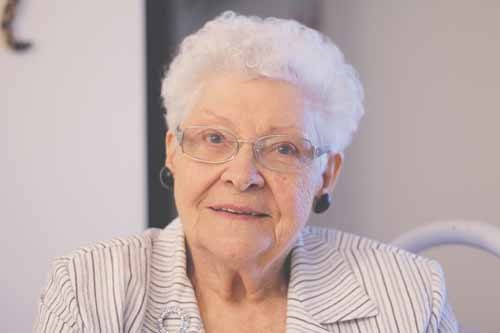For over 30 years, people in Yorkton with vision loss have drawn support from their peers in a group administered by the Canadian National Institute for the Blind (CNIB).
"The Peer Support Group is an opportunity for people who are blind or have low vision to get together with other people in the same situation. It's an opportunity to network, to learn, to problem-solve, to get information from CNIB about things happening," says Patricia Fiori, CNIB Regina's volunteer services coordinator.
CNIB's point of contact with the group is Bob Parker, a social worker, legally blind himself, who attends most of the meetings. But because the organization has no branch office in Yorkton, the peer group has always been maintained by local volunteers.
Originally, the job fell to the local Lion "L" club and chairperson Elaine Parr. Parr does not suffer from vision loss herself, but is such a believer in the support group's mission that she continued to coordinate it for 31 years: long after the Lion "Ls" disbanded.
"I was shocked to find how many people in Yorkton do have vision impairment," says Parr. "Until you get into it, you don't really know."
Today, the support group is coordinated entirely by its members - primarily by Elsie Raddysh and Sylvia Ukrainitz, who took over when Parr retired two years ago.
The group nearly fell apart at that time, but its members decided it was too important to lose.
"All of us are in the same position, and we help each other out with our problems, and we socialize. We're all in the same boat, you might say," says Raddysh.
"We understand each other, and the general public often doesn't," adds Ukrainitz.
Much of the public fails to understand that vision loss and legal blindness are a broad spectrum. In fact, none of the members of the support group are completely blind, and both Raddysh and Ukrainitz, who have macular degeneration, are able to walk about in public unassisted.
This can lead to misunderstandings.
"If you're in the mall, you'll pass somebody and they'll think you're stuck up because you don't say hello," says Raddysh. "Well, if I'm not right beside them, I don't know who they are."
The Peer Support Group is an outlet for frustrations like these. After several decades, it has become a vital source of information and moral support for many of its 25 members.
"We have some people who are living in their house at 90, and we hear about all the things they do: they garden, and they travel anywhere," says Ukrainitz. "It's nothing for them to catch a plane somewhere. I listen to them, and it's marvelous."
Much of what is shared at the monthly meetings at Queen Elizabeth Court is practical. The members exchange ideas for coping with their disability, and Parker offers information or hands-on demonstrations of assistive devices offered through CNIB: everything from magnifiers to audio book readers to talking clocks.
The motivation the group provides is particularly important to those first adjusting to vision loss. Ukrainitz joined the group about nine years ago after being afflicted with macular degeneration in her right eye, having already lost most of the vision in her left eye from a separate condition. She remembers the frustration she felt about her loss of independence and the anxiety about failing at tasks that used to be simple. Members of the Peer Support Group helped.
"They told me, 'Sylvia, you're going to get used to it.' And by golly, you do," she says. "You have to slow down in everything you do, and you can't let things get to you. You have to learn to be more relaxed.
"I didn't want to ever let myself get depressed. I thought, 'I just have to beat this thing. There are things worse in life. I don't have pain. I'm going to get used to this.'"
Raddysh adopted a similar attitude.
"You get angry first - why me? And then you feel sorry for yourself. And then you have a good cry. And then you carry on. What else can you do?'"



